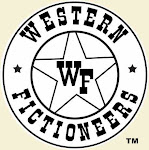Morning java still ranks as a good way to kick-start a day–much the same way it was in frontier America. The process of brewing coffee back then, however, involved a lot of moving parts and required loads of patience.
The selection was fairly basic. The coffee beans were green. They first had to be roasted on a wood stove in an open skillet. On the trail, the roasting took place over a campfire. After the bean were roasted, they were placed in a bag and crushed–often with the butt of a rifle or an axe handle.
The typical brewing formula was straightforward: a handful of crushed coffee beans in a cup of hot water. This concoction yielded a robust cup of coffee, but far from what we might consider a satisfying taste. Nothing at all like a Cinnamon Dolce Latte, Caramel Macchiato, or Skinny Peppermint Mocha.
The typical brewing formula was straightforward: a handful of crushed coffee beans in a cup of hot water. This concoction yielded a robust cup of coffee, but far from what we might consider a satisfying taste. Nothing at all like a Cinnamon Dolce Latte, Caramel Macchiato, or Skinny Peppermint Mocha.
During the Civil War, Union solders never suffered any shortage of coffee beans.
Confederates, however, found that coffee commanded outrageous prices because of its scarcity, so many went without the dark elixir. As a result, coffee became a major trading commodity between the two sides.
When solders from each side met periodically–on an informal basis–Yanks would trade coffee for Virginia tobacco.
The were a couple of clever innovations brought about by the war.
Some regiments of the Union Army were issued special rifles–one per 100-man company–that had a coffee grinder built into the butt of the stock. And, although the first coffee filter wasn’t officially patented until 1908 (by a German housewife), Civil War soldiers created their own filters.
Unlike the paper or gold filters we use today, soldiers often let the brew settle for a few minutes and then poured it through a piece of flannel to remove the grounds and improve the taste, according William C. Davis, in his book, Civil War Cookbook.
The coffee industry underwent a dramatic change at the close of the Civil War.
John and Charles Arbuckle, who owned a Pittsburgh grocery business, discovered a process for sealing in the flavor, and aroma, by coating coffee beans with an egg and sugar glaze; the wash also prevented the beans from spoiling.
“I need a cup of Arbuckle’s,” cowboys used to say, and the name became interchangeable for coffee. A great example of successful word-of-mouth advertising.
Arbuckle’s went a step further in marketing efforts by offering coupons and trading cards, many of which are available on eBay.
Marketed under the name Arbuckles’ Ariosa Coffee, the product’s airtight, one-pound packages became a big hit.
Chuck wagon cooks liked them because they faced the task of brewing plenty of coffee to satisfy the appetites of cowboys who spent hours riding a cold range.
Ever wonder how you would have coped with a coffee addiction in the 19th century?
Would a cup of morning Joe be worth the effort it took to crush beans, roast them in a skillet or open fire, and then strain the dark, brown liquid through a piece of flannel?





Fascinating post, Tom. Is Arbuckle's still available? I tried to look for it on the internet without success, I expect the egg coating would run into problems with the FDA. If it did become unavailabke, do you know when?
ReplyDeleteHi Keith, yes, Arbuckle's is still going strong (so to speak) and sells coffee, tea, and herbals. Also a tab with a bit of its coffee history - bit.ly/1yUwcIb
ReplyDeleteDarn right it would've been worth it.
ReplyDeleteTom, that bit of history is as rich as a good cup.
ReplyDeleteGood stuff.
Jerry
Tom,
ReplyDeleteI agree with Jerry Guin, a fabulous and invigorating bit of history. Obviously, the years of Tom Rizzo's professional career and expertise in research and journalistic experience is shining through. Perhaps one day we'll sit down and discuss some of this over a strong brew?
Charlie
Frank, Jerry, Charlie--We could problem solve a lot of problems with the world over a steaming hot, strong cup of black coffee. I'm sure you three could share some great stories.
ReplyDeleteThank goodness I don't like coffee, I'd never have had the patience. Still this bit of history was fun. Thanks Doris
ReplyDeleteThanks, Doris. You're rare. How can you survive without it? lol
DeleteTom - thanks for an interesting bit of coffee history for us addicts! Yes, I'd still have roasted my own beans and pounded the hell out of them for a morning cup. I'm one of those purists who grinds my own anyway - although I do use pre-roasted beans and an electric grinder!
ReplyDeleteTom, what about chicory? wasn't that an alternative for the poor Rebs who couldn't get real coffee beans? or is that something else?
ReplyDelete